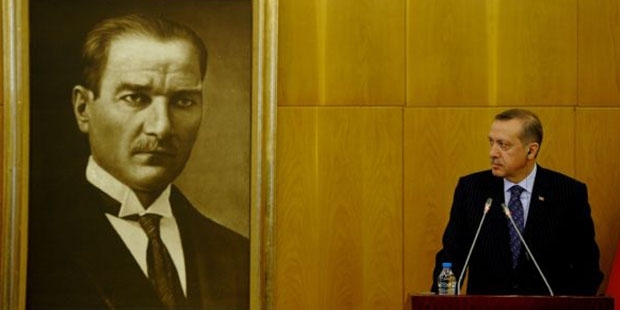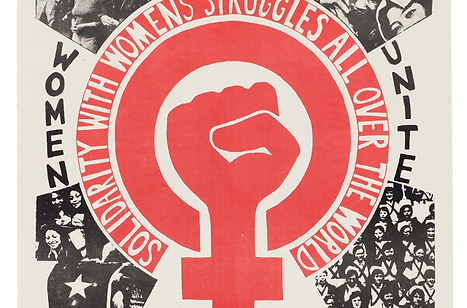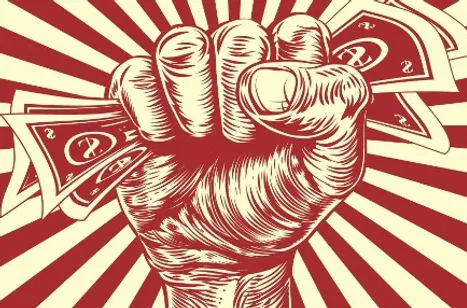
Dune, Kemalism and The Evil of the Crowd 1/2

When Frank Herbert wrote Dune, he was heavily inspired by the early Islamic conquests and the ever-surrounding deserts of Oregon in which he grew up. It was a classical hit and gave an eerie synthesis of the primal desert life and the futuristic tech it contained, but it would be a stretch to say it had a large following.
Recently, it was adapted into a movie and adapted quite well indeed. To sum up, the plot revolves around political clashes between certain parties over the domination of an inter-terrestrial empire. The petroleum of Dune? “Spice”. It is the Hashash of this fictional world, both used by the desert dwellers -whose lands are house to the richest source of spice- and also used by navigators as fuel.
In his book, Herbert heads straight into this mystic world with its Arabic-inspired words and thousands of years of fictional history; Villeneuve who also directed Cyberpunk 2077 -does a splendid job of introducing the viewer to this world, albeit at a sluggish pace that costs him more than two hours of screen-time.
After all this hubbub and whatnot, we finally get to see what the book is really about: A Messianic figure appears and gathers these desert-dwellers, and finally gives them independence over their own planet. Unsurprisingly, he goes on to conquer other people’s land, with billions of people dead, but we’ll stop there.
What we want to focus on is the aim of what Villeneuve was and how it was interpreted by the viewers. It is not uncommon to see small groups of people gathering around evildoers, charmed by their charisma. It is often said that those who lack empathy are often the most charismatic.
The alluring point here is that Herbert had had the same problem, and Villeneuve tried to fix it. He failed.
When a person creates a story, the language creates its own world. Use beautiful instead of stunning and you might think that a top model is a rather common beauty; even though it isn’t false. (I’m not gonna pretend I’m the one who is the genius behind this idea but I’m too lazy to find the exact Foucault quote)
Another aspect is perspective: Tell the story of Hitler from the perspective of his sycophants, and you get quite a different image, albeit a fictional one.
The point is that whatever you do, however you want to make an “objective” work, it will always be bound to be subjective.
Returning to the topic at hand: Herbert created a story where his Messiah – named Paul- is surrounded by millions of fanatical believers who were absolutely loyal to him. As we’ve said, he went on to kill millions with his army of believers.
When Herbert noticed that the readers weren’t seeing the result but rather even supporting Paul, he must’ve been flabbergasted. He mentioned in an interview that the book was misinterpreted and his intended message was quite different from what some people understood. Delle went on to give a twist and make one of the central characters, Paul’s lover, an opposition. A cynic amid an army of unbelievers. Now, there are quite a few scenes given to emphasize the evil that Paul will realize in the future: He doesn’t want to be a messiah, and he has the “prophetic” ability to see the future, so he knows he will kill billions if he realizes the prophecy. His lover entreats him to stay true to himself and exclaims that the idea of a messiah only stagnates the community, making them slaves.
Alas, after Herbert, Villeneuve has also failed in his attempt to make his intended message noticed. What is the significance of this, you might ask? Is the world turned upside down, now that a fictional character is the subject of a few edits? Of course not. It’d be absurd to claim that men are evil because there are people who support Paul, or Darth Vader persay. These are fictional characters, and it’s not as if people make these comments in their full identity. Internet is a different environment, there is no supervision when you comment, and no one watching to condemn you directly or give instant feedback to your opinions. It’s relatively easy to agree that people don’t act the same way they do in real life when they’re on the net. It must not be ignored, however, that the idea of Mahdi- who will save us from all suffering is reoccurring in human history. Turkish culture has a special spotlight in this regard, it’s best and worst coming from prophets and false prophets, the identification depending on your belief system.
What would you answer if you were asked to name historical figures or politicians identified as saviors? I’d be betting that the first one is Atatürk (“Halaskar Gazi” literally the Savior) or perhaps- if you’re from a rather different circle- Erdoğan. In the latter case, the adoption of conservative Islam on a national level and the political opportunism brought by the revolutionary changes of the 2000s -which was identified with the government rather than the times by the masses- combined with the charisma of a skilled politician and people enraged by cultural suppression, you get the “Anti-Atatürk” as A. Bakshian calls it.
Now, the point of this little – even though it’s rather longer than my university assignments- essay I wrote on a sleepless Saturday night isn’t to cause hellfire to unleash upon me from all sides, it’s to point out a common feature of both of these figures, whether you support either party or none: The fanaticism, branding of any “heresy” and also the reliance on symbols.
What do I mean? Let’s see: The hijab, or the hat; beer or a more relevant example: fasting or not fasting or perhaps even the side you take on the Israel and Palestine conflict.
The list goes on and on. The important point here is that no group has a rational basis for each of these topics, it’s simply fueled by a bond of emotion over the imagined or practical sacredness of these values and any opposition to them brings all the vices one presumes in the “other”. In any sign of difference over these symbols, the person is branded with all the attributes of the other.
Whether you are one of the people who believe in “not believing in what your father has believed”[1] or rather perhaps in “...no dogma, no superstition... only science”[2] the common ground should be rationality. Without it, neither Kemalism nor Islam can develop with a sound ideological basis; they’ll be “frozen” along with the people who are bound to them. The ones who break away will steer to other paths, leaving these untended, undeveloped, and in the twilight of their life cycles -against a world that is forever expanding.
[1]"And when it is said to them, 'Follow what Allah has revealed,' they say, 'Rather, we will follow that which we found our fathers doing.' Even though their fathers understood nothing, nor were they guided?" (Quran 2:170)
[2]Ben size hiçbir dogma, hiçbir kalıp bırakmıyorum.
[2]Tek hakiki mürşit ilimdir, fendir.





